
Message from David Sylvia, Professor and Head
Greetings from Happy Valley! The next crop of graduates is out the door (see insert) and, after finally receiving much needed spring rain, the agronomic crops have emerged in central PA. I am pleased to report that we had another engaging and productive year (and I'm not just talking football). Even in these challenging financial times, our faculty continue to compete well for state and federal grants, publish their findings in high quality journals, and transfer practical knowledge to our valued clientele. We are attracting record numbers of excellent graduate students, and our undergraduates continue to be successful in landing jobs in their field. I trust you enjoy reading about some of these accomplishments on the following pages.
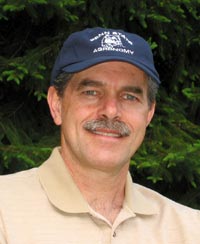
Recently, I had the opportunity to participate in a workshop, held at Wageningen University in the Netherlands, on the future of farming in Europe. In many ways Pennsylvania agriculture more resembles European systems than the large commodity farms of the US Midwest--just consider our varied landscapes, close proximity to urban areas, and concerns with environmental issues. Our challenge is to discern the proper balance between profit (maintaining economic resilience), people (resolving social and resource dilemmas), and planet (improving ecological services). The Europeans are contemplating their transition from the "food valley" that was based on commodity production to the "green valley" that gives added value to the landscape and regional supply chain. Another emerging area is the "energy valley" where we seek to find our place in the renewal energy economy. I believe that the University in general, and our College and Department in particular, are very well positioned to make important contributions to the discovery of new knowledge and delivery of innovative ideas that will lead to a more sustainable and vibrant Pennsylvania.
A significant development over the past year was the formation of the Environment and Natural Resources Institute (ENRI) in the College (see http://enri.cas.psu.edu/ for additional information). Faculty in Crop and Soil Sciences contribute to this effort by participating in emerging centers of excellence concerning biomass energy, nutrient management, and sustainable agriculture.
To meet the challenges ahead we must be committed to top-level science to develop a reliable knowledge base, embrace a multidisciplinary approach to understand integrated systems, and promote new alliances and co-innovation (i.e., public-private partnerships) to find workable solutions to complex problems. I believe our faculty, staff, and students are ready to do just that, and that is why I am bullish on the years ahead.
HIGHLIGHTS
Research
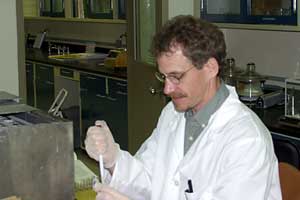
Improvements in scientific methods and measurement technologies are a major driving force for scientific discovery and technological development. As a result, the Department supports Dr. Douglas Archibald's tool-based research program, which is aimed at applying and developing state-of-the-art chemical analysis techniques tailored for a variety of agricultural, environmental, and natural resource issues faced in our disciplines. His appointment grew out of a past research program on the development of near-infrared spectroscopy (NIRS) for crop analysis. Archibald continues to provide training and support to Agronomy and Turfgrass graduate students who use this important technique in their research on forage and crop quality or crop response.
NIRS is only the tip of the iceberg of the need for training in analytical chemistry in agronomy -- often our graduate research projects generate challenging molecular or elemental characterization problems, and frequently the quality and efficiency of our research is affected by the choice of technical approach. Some examples of Archibald's activities include analysis of multiple mycotoxins in plant tissues using high-performance liquid-chromatography with fluorescence or mass-spectral detection, analysis of fatty acid profiles in forages and animal food products by gas chromatography with flame ionization detection, and attenuated total reflection Fourier transform infrared (ATR-FTIR) characterization of the complexometric titration of zinc ions with soil organic matter model compounds.
Archibald's principal areas of expertise are spectroscopy and chemometrics. The latter is the science of interpretation of data from chemical instrumentation. One of Archibald's research goals is to develop these techniques for rapid, high-throughput determination of soil composition, molecular structure, and functional properties. Using FTIR with multivariate calibration, his research group can accurately determine soil organic matter content with minimal sample preparation and at low cost per assay. Soon the lab will expand that capability to the assessment of the molecular quality and spatial distribution of soil organic matter.
Archibald's goal of developing rapid low-cost fat assessment technologies promises to enhance multiple areas with relevance to crop and soil sciences. Microbiologists have established that soil fatty acid profiles can provide a window into its microbial ecology, which can be an important determinant of soil processes or functional properties. Similarly, researchers, agricultural producers and consumers desire to know the fatty acid and fat-soluble vitamin profiles of dairy and meat products. The driving force for this interest is the fact that animal production system, for example grass-fed versus grain-fed, influences the nutritional characteristics and market value of animal food products. A third area addresses the public need to understand how the fat composition of different oilseed feedstocks affects biodiesel performance. In each area the target of his research is a rapid analysis system based on relatively low-cost instrumentation, procedures that are very simple to perform, and data analysis that is semi- or fully automated. Interested persons should contact Archibald at dda10@psu.edu or 814-865-8449.
Teaching
Teaching the array of students majoring in Turfgrass Science at Penn State presents unique challenges and opportunities says Dr. Andrew McNitt. Currently the Turfgrass Science major boasts a resident enrollment of about 230 students, 185 of which are four-year Bachelor of Science students and 45 are enrolled in the Golf Turf Management two-year certificate program. Penn State also offers both certificate programs and a B.S. in turfgrass science online through Penn State's World Campus Program. Thus far 155 online students have received certificates of completion, 55 have received an advanced certificate and 1 has received a B.S. in turfgrass science. (Congratulations to Bob Ehrler, the first online student to complete the B.S. degree.) The program expects many more online B.S. graduates in the future as this option has only recently become available.
The average background of these learner groups varies. The four-year resident students tend to be younger and have less life experience than the adult online learners. The four year students are essentially a clean slate and the professor must constantly stress the relevance of the material being presented. The four-year students have an advantage over the two-year technical students as they receive a stronger foundation in basic science.
The two-year technical students are typically returning adults learners and must have at least two years of experience to be accepted into the program. The two-year students tend to integrate information with their practical experience much more quickly than the younger students and are always asking, what if questions, related to how a particular maintenance issue fits into an overall course management scheme. The two-year students tend to be very practically oriented and an effective instructor will constantly use real world examples to illustrate how science can help the superintendent make critical management decisions.
The online learners cover the spectrum of experience from professionals seeking a career change to experienced golf course superintendents seeking a degree in order to obtain their Golf Course Superintendents Professional Certification. And therein lies the challenge for an online instructor. Online learners can feel isolated and those with less practical experience are often intimidated with the bulletin board conversations taking place between experienced turf professionals and the instructor, and are sometimes afraid to ask simple questions. The instructor must work to create an open atmosphere that encourages questions ranging from very basic to very complex in order to maximize the experience for all learners. Sometimes it helps to place them in small groups where no one but the instructor and a few other group members can see their interaction.
More information about the degree and certificate programs in turfgrass science at Penn State can be found at: http://turf.psu.edu/
Extension
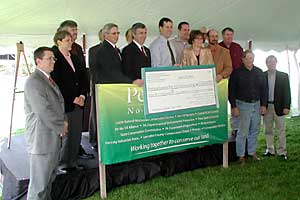
Dr. Sjoerd Duiker, associate professor of soil science, works with colleagues in the Penn State Crop Management Extension Group to improve crop and soil management in Pennsylvania and beyond. He teaches about management practices that improve soil quality, focusing on permanent use of no-tillage crop production, increasing diversity in crop rotations, and use of cover crops. He developed educational materials about soil compaction diagnosis, avoidance, and remediation. In his research program Duiker investigates technologies and management practices that support his outreach program. He believes he can best serve the farmers and other citizens in Pennsylvania by developing outreach activities with innovative producers. In 2001 he started a no-till field day program with Amish farmers in Lancaster County that has stimulated many to adopt and improve their no-till system. He also works with other leading no-till producers. In 2005, Duiker was part of the foundation of the Pennsylvania No-Till Alliance, an organization of no-till practitioners that encourages increased adoption and continued improvement of no-till crop production. This grass-roots organization is an illustration of how change towards a more sustainable agriculture can be achieved without what Duiker calls "sticks (laws) or carrots (subsidies)".
Student Profiles
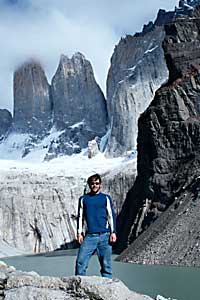
Jason Stuckey, an M.S. candidate in Soil Science has been studying in Chile since January 1. He lives in Quillota, which is two hours northwest by bus from Santiago and one hour east of the beach.He lives in a pension on a couple acres of land owned by the Pontificia Universidad Católica De Valparaíso, which houses roughly 20 Chilean agronomy students. Stuckey is working in conjunction with Drs. Enid Martínez and Sridhar Komarneni from our Department, and Alexander Neaman, a professor of soil science in Chile. Under the guidance of S. Komarneni and Ramesh Ravella, a Ph.D. candidate in the Soil Science major, Stuckey synthesized 500 grams of Na-4-mica, a synthetic clay originating from kaolinite. Laboratory studies have shown this clay tends to preferentially bind copper to its structure. They have reason to believe this may be useful in remediating-contaminated soils near mining operations. Stuckey is conducting a batch study to monitor the soil pH, free copper activity, and salt-extractable copper concentration in the soil solution, as the mica reacts with the copper-contaminated soils during wet-dry cycles. He hopes to see a decrease in free copper activity and salt-extractable copper in the soil solution as reaction time between the mica and copper increases. He will also conduct a field pot study to assess the ability of the mica to diminish or eliminate copper toxicity to plants. Outside of research, Stuckey spends much of his time playing soccer, volleyball, ping pong, and chess with his roommates in the pension. They do a lot of cooking and barbecuing and Stuckey enjoys learning Chilean cooking techniques from them. In addition, he traveled with a friend from Cal Poly to the south of Chile where they went backpacking in Torres del Paine.
ACTIVITIES
The Agronomy Club held its First Annual Line Dance, last spring. The dance took place in a barn at the Agronomy Farm in Rock Springs. Kelly Book, Amy Shollenberger, and Sarah Tuttle instructed a group of about 50 students and faculty on various line dances. In addition, Kadie Vanderman demonstrated the art of cattle roping.The line dance was a hit. The Agronomy Club will be selling Blue and White popcorn at one of the home football games this fall, and possibly at a local farmers market. The club plans to present a poster of their Blue and White Popcorn project at the Annual Meeting of the Tri-Societies next fall. Club members also attended the Student-Industry Workshop sponsored by the PA Agronomic Education Society (PAES). During the session, four PAES members came to campus to explain what they do in their respective jobs and illustrated opportunities that exist for students upon graduation.The Agronomy Club would like to thank its advisors Kate Butler and Scott Harkcom for all their help, support, and encouragement throughout the year.
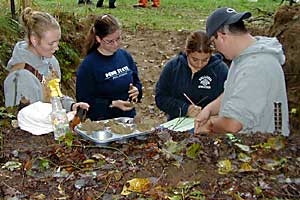
The PSU Soil Judging Team participated in the North East Regional Collegiate Soil Judging Contest this past fall, hosted by the University of New Hampshire. The team consisted of: Rebecca Sankey, Rachel Ballance, Afton Campbell, and Sean Wolfe. The students gained valuable hands-on experience and had the opportunity to study soils affected by glacial processes. They enjoyed interactions with the NRCS professionals, other universities, and meeting new students. This fall Coach Mary Kay Lupton and her team will be traveling to The University of Maine for the next competition.
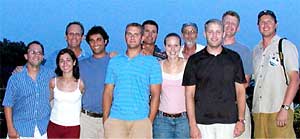
The PSU Weed Science Team. Last year, Penn State hosted the NE Weed Science Society -- Collegiate Weed Science Contest at the Research Center in Landisville. Dave Johnson, senior research associate and assistant professor, coordinated the event with the help of numerous volunteers from Penn State and others in the ag industry. This year's contest will be held in August and will be hosted by DuPont Crop Protection at their Stein-Haskell Research Center in Newark, DE.The day-long competition brings together approximately 40-50 graduate and undergraduate students from northeastern universities in the U.S. and Canada. Students compete as individuals and as teams for regional awards and for fun. The contest consists of competition in four areas: 1) weed identification; 2) sprayer application technology; 3) diagnosis and identification of herbicides by symptoms; and 4) problem solving and recommendations in a field setting (role-play event). The contest is open to graduate and undergraduate students interested in weed management in agroecology (agronomy), horticulture, turf, and natural areas. So far, this year's team includes: Joe Dauer, Steven Mirsky, Matt Ryan, Atila Deak, Lindsay Spangler, Jennifer Bechtel, and Genny Christ. Regardless of the contest outcome, it provides a lot of helpful experiences for future use and allows students to interact with other colleagues in the weed science profession. Dwight Lingenfelter will again coach the team in preparation for the exciting challenge.
The PSU Turfgrass Club is very active in bringing together activities for all students studying turfgrass in both our B.S. Turf Science program as well as our Golf Course Turfgrass Management Technical Program. Speakers are invited from many areas of the industry including Golf and Sports Turf Management, Turf related equipment and supply sales, professional organizations related to the turf industry as well as individuals qualified in specific areas of management within turf operations such as those specializing in irrigation or equipment maintenance and management. This past October, turf students traveled to Merion Golf Club in Ardmore, PA, to compete against students from Michigan State University in our annual Cutter Cup match play golf tournament. We are proud to announce that Penn State defeated Michigan State 3 ½ to 1 ½ in 11 holes. The weather was rainy, the course was very difficult…but everyone had a smile on their face as they experienced the legacy of the Merion East course. The PSU Turfgrass Club meets every Tuesday evening in Room 101 ASI Bldg at 6:30 PM during the fall and spring semesters. Guests are encouraged to attend and always welcome.
Symposium Notes
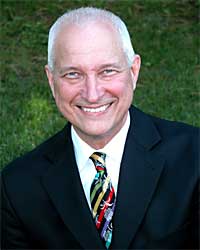
The fourth Alumni-Sponsored Symposium will be held October 6, 2006, at University Park. Alumni activities will begin at 11:30 with a complimentary lunch at the Stone Valley Recreation Area Picnic Pavilion, followed by a tour of the Shale Hills Catchment project. The award presentation and symposium will begin at 3:30 p.m. in 101 ASI Building. This year's symposium will focus on opportunities in environmental consulting. The afternoon will conclude with a reception in the ASI Lobby. Please see enclosed flier for further details.
This year's outstanding Alumni Award winner is James Dragun (MS, 1975; PhD, 1977), president and founder of The Dragun Corporation. Dragun is an internationally recognized authority on the fate of chemicals in soil and groundwater. He has written several books on soil chemistry, including, The Soil Chemistry of Hazardous Materials, Second Edition, which was released in 1998.
Nominations for our 2007 Outstanding Alumni Award are due January 5, 2007. Nomination forms are available at cropsoil.psu.edu/alumni/awards/distinguished-alumni-form.pdf
NEWSBRIEFS
Faculty Updates
Robert (Rob) Gallagher joined the Department in January, 2006, as an associate professor of cropping systems. His research focuses on: 1) soil seed-bank ecology, 2) plant-soil interactions, and 3) agroecosystem development and management. Gallagher is particularly interested in niche differentiation among plant species within a community. He teaches AGECO 461 and will be developing a graduate course in cropping systems. He earned a Ph.D. in 1996 from Ohio State University.
Dawn Luthe joined the Department in January, 2006, as a professor of plant stress biology. Luthe's research interest is to learn how plants respond to environmental stresses at the physiological, biochemical, and molecular levels. The two major areas of research in her laboratory are focused on understanding how corn defends itself against herbivory by caterpillars and the aflatoxin-producing fungus, Aspergillus flavus. Luthe earned a Ph.D. in 1976 from Wisconsin.
John (Jack) Watson, professor of soil science, moved from the associate director for cooperative extension role at Penn State to the Department in April, 2006, to focus his time and efforts as a faculty member. He plans to use his skills to solve soil science challenges for agricultural producers and other clientele. Watson's professional interests include soil- water variability, water quality protection through agricultural best management practices related to irrigation and nitrogen fertilization, water quality for domestic consumption and optimum crop production, and effluent reuse options. Watson earned a Ph.D. in 1982 from the University of Arizona.
Surinder Chopra (maize genetics), Sjoerd Duiker (soil physics), Hangsheng Lin (hydropedology/soil hydrology), and Andrew McNitt (turf soil science) were granted tenure at Penn State and were promoted to associate professor.
Peter Kleinman, adjunct assistant professor of soil science and R. Howard Skinner, adjunct assistant professor of agronomy, were promoted to adjunct associate professor. Janis Pruss, affiliate instructor of agronomy, was promoted to senior instructor in crop and soil sciences.
Rick Day, associate professor of soil science and environmental information systems, received the 2005 Outreach and Cooperative Extension Vice President's Award for Entrepreneurship Award.
Surinder Chopra, associate professor of maize genetics, and David Sylvia, professor and head, were elected to membership in the PSU Chapter of Gamma Sigma Delta Honor Society of Agriculture.
Jonathan Lynch, courtesy professor in Crop and Soil Sciences and professor of plant nutrition in Horticulture, was named a distinguished professor of the Mexican Academy of Sciences.
Joseph Duich, professor emeritus of turfgrass science, was selected to receive the 2006 Old Tom Morris Award from the Golf Course Superintendents Association of America.
Edward Ciolkosz, professor of soil genesis and morphology, retired June 29, 2006
Wayne Hinish, associate dean emeritus and professor emeritus of agronomy, died January 24, 2006, at the age of 80
Staff Updates
Rob Dickerson, database administrator and webmaster, recipient of the outstanding Support Staff Award from the Northeastern Branch of the American Society of Agronomy.
W. Scott Harkcom, farm manager, recipient of the 2006 Outstanding Staff Award.
Student Updates
Atila Deak, recipient of Penn State Gerald O. Mott Meritorious Graduate Student Award in Crop Science. Keisha Johnson, recipient of the first Outstanding Student Service Award. Jennifer Hindman was elected to membership in the PSU Chapter of Gamma Sigma Delta Honor Society of Agriculture. 2006 Gamma Sigma Delta Research Exhibition award recipients: Jing Dai, Farag Ibraheem, Rajandeep Sekhon, Rupinder Randhawa, Loren Byrne, and Lindsay Spangler. James Brosnan, recipient of the National Sports Turf Manager's Association's Outstanding Graduate Student Award. Center for Environmental Chemistry and Geochemistry (CECG) top poster award recipients: Rupinder Randhawa, Mary Kay Lupton, Matthew McCoy, and Loren Byrne. Lindsay Spangler was recognized by the National Student Recognition Program sponsored by the American Society of Agronomy, for her outstanding undergraduate career.
Excellence Fund
This fund is used to facilitate important projects that would otherwise be impossible with the reality of diminishing public support. Examples of uses for your gift monies include helping deserving students present research results at professional meetings, facilitating development of teaching materials, and providing resources for graduate students to conduct exploratory research. If you wish to donate to this fund please make your check payable to Penn State (with a notation in the memo section of the check "Crop and Soil Sciences Excellence Fund") and send to: Office of Development, College of Agricultural Sciences, The Pennsylvania State University, 233 Agricultural Administration Bldg., University Park, PA 16802, or you may donate online at: https://secure.ddar.psu.edu/GiveTo/ All donations are tax deductible.
Thank you for your support!
Crop & Soil Update is published by the Department of Crop & Soil Sciences, The Pennsylvania State University, University Park, PA 16802, (814-865-6541)
Editorial comments and opinions expressed in Crop & Soil Update do not necessarily reflect the views of The Pennsylvania State University or the Department of Crop & Soil Sciences. Use of trade names implies no endorsement by Penn State.
DEPARTMENT HEAD: David Sylvia
EDITOR: Kathy Barr
This publication is available in alternative media on request. The Pennsylvania State University is committed to the policy that all persons shall have equal access to programs, facilities, admission, and employment without regard to personal characteristics not related to ability, performance, or qualifications as determined by University policy or by state or federal authorities. It is the policy of the university to maintain an academic and work environment free of discrimination, including harassment. The Pennsylvania State University prohibits discrimination and harassment against any person because of age, ancestry, color, disability or handicap, national origin, race, religious creed, sex, sexual orientation, or veteran status. Discrimination or harassment against faculty, staff, or students will not be tolerated at The Pennsylvania State University. Direct all inquiries regarding the nondiscrimination policy to the Affirmative Action Director, The Pennsylvania State University, 328 Boucke Bldg, University Park, PA 16802-5901, Tel 814-865-4700/V, 814-863-1550/TTY.
U.Ed. AGR006-06
Department of Plant Science
Address
102 Tyson BuildingUniversity Park, PA 16802
Department of Plant Science
Address
102 Tyson BuildingUniversity Park, PA 16802

